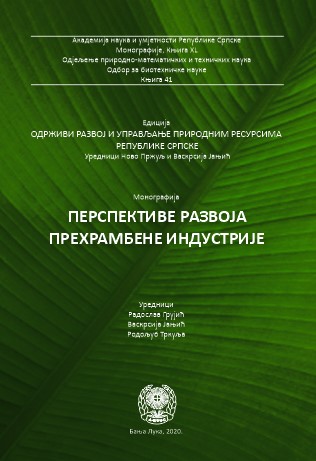Indigenous Cheeses in the Republic of Srpska
DOI:
https://doi.org/10.7251/EORU2002235BKeywords:
Cheese production, Indigenous cheeses, Republic of SrpskaAbstract
Cheese, as an important foodstuff, has a wide importance nowadays, because it represents cultural and traditional mirror of some area or country. Production and consumption of cheese dates back to few thousands years, so cheese represents one of oldest foodstuffs. In the last few decades, production and consumption of cheese on the global level is steadily increasing. Based on all indicators, moderate growth of the world cheese production should be expected. By percentage, the highest growth of production and placement of cheese is expected on the markets with very modest consumption per capita (Asia, Africa and Middle East), but the growth is also expected on other markets. Since there is a huge potential to increase their assortment and placement of their products, the biggest cheese producers, especially from European Union, see the opportunity on these markets. Increasing trend of fast food also favours to the biggest cheese producers. The new policy inherent to modern industrial cheese production that could be described by the slogan „we produce what you want to purchase“ comes to the fore in the fullest sense. Tendency of increased production and placement of special varieties of cheese has been perceived in many countries. That implies autochtonous varieties of cheese, cheese with different kinds of additives as well as organic production of cheese which becomes popular in the recent years. Research of autochtonous cheeses aimed at protection of the origin of cheese or the geographic origin of cheese has been present in the EU as well as safety issue, especially in the production of autochtonous cheese. In the area of Republic of Srpska, production of autochtonous milk products, including cheese, has a strong tradition. Technology of production of autochtonous cheese in Republic of Srpska is very simple and it could be produced even in modest conditions of mountain areas. Geographical location and altitude and richly mountain pastures favour to rearing of cattle as well as sheep, so there is a big share of sheep cheese with special characteristics. Because of communication isolation of mountain areas, traditional production stayed quite „sealed“ in the rural homesteads, so milk processing is almost unchanged untill the present date. Therefore, all cheeses in Republic of Srpska have been preserved, although production of milk and production of cheese consequently has been decreased due to population displacements. Faced to industrial production which becomes more massive, autochtonous cheeses are using different possibilities in order to survive and avoid the hazard of dissapearing. Industrial production of cheese in Republic of Srpska in the period 2014-2017 amounted 2,00 – 3,17 thousands of tonnes and had tendency of significant growth. Converted into nominal value, it would be in a range from 7,00 to 11,6 million BAM. Certainly, these are the facts that should encourage domestic producers. However, it is difficult to express the actual production of cheese, since production in production facilitiesregistered as craft shops as well as production in agricultural farms haven't been subject of statistical recording. Coverage of the quantity of export by the quantity of cheese import in the Republic of Srpska is on the level of 10% and looking by the value the amount is 5%. In 2018 Republic of Srpska imported cheese worth BAM 7,86 million while the value of exported cheese was BAM 391.000. Small scale of production compared to needs and international competition is not in accordance to low prices, since domestic producers of industrial cheeses don't have capacities to ensure quantities which could provide reduction of average costs per production unit. In the long term, this kind of strategic approach could threaten the market position and existence of cheese producers also. A wide offer of cheeses as well as well possibility of choice affects on more intensive demands of consumers focused on the quality of cheese and food safety. Fulfilment of the standards in all phases of the process of production requires significant financial resources from the cheese producers in the Republic of Srpska. Because of the lack of financial resources, cheese producers are focusing on the production of cheaper cheeses (the share of fresh cheese with low price value in the total amount of cheese exported from Republic of Srpska is 79%) and export to less demanding markets. Possibility to provide autochtonous cheeses which kept traditional manner of production to more demanding consumers on the domestic as well on international market is one of the important factors that gives competitive advantage to cheese producers in Republic of Srpska. These kind of cheese contribute to the living cultural and gastronomic heritage of their area and they have added value as a result of the skill and determination of the producers to keep the traditional manner of production as well as influence of the geographical area of their origin. That's why there is a necessity of merging of producers and protection of cheeses by the designation of origin and geographical origin, certification of production of organic cheeses and by the designation „GMO free“ for the cheeses produced by the milk of the animals that were not in the contact with genetically modified feed in their feed supply chain. No matter the limited quantities, the characteristic of all autochtonous cheeses in Republic of Srpska is recognizable and unique quality and specialness that is closely related to the geographical area of their origin as well as kept traditional manner of production which has been passed down from generation to generation in the specific geographical area. Exactly this distinctness in conjuction with the development of logotype, packaging, slogan, web presentation as well as other kind of marketing could build these cheeses as a strong brend that will be a driving force of the economy of this area.
